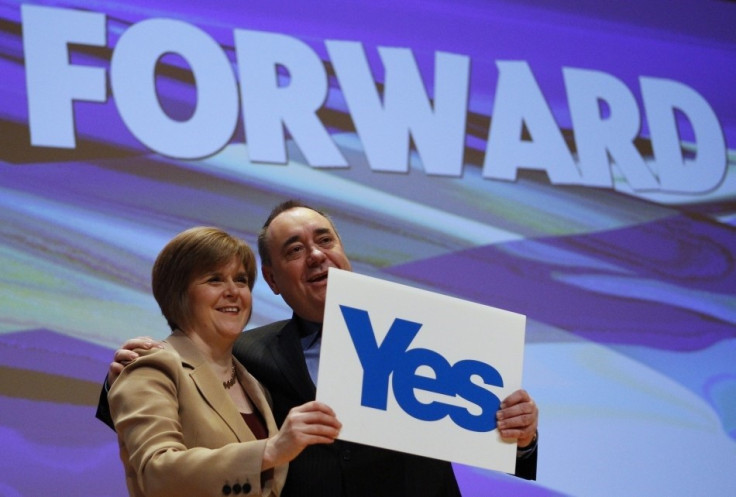Scottish Independence: It's a Kind of Magic

It's sometimes suggested that there's a fundamental distinction between the desirable phenomenon of patriotism and the backward phenomenon of nationalism. If there's the slightest grain of truth in that claim, then I fear we may have got our terminology for the Scottish independence referendum in something of a muddle.
One of the features of the Scottish national movement that I've always found most attractive is that its faith and pride in our country is not coupled with a belittling of other nations. There's no trace of the oft-heard American delusion that "this is the greatest nation on Earth, and others must earn our respect by paying homage to our superiority". We recognise that Scotland is a small country, no better than any other - and feel that, like almost all other countries, it would be better off running its own affairs. It's a refreshingly humble sort of national pride.
Contrast that with the chauvinistic language that is the hallmark of British nationalism (or, as we're euphemistically required to call it, "unionism", "anti-separatism" or "Euroscepticism"). Think about it for a moment - what "positive" argument for the British nation state have you ever heard that doesn't boast about how much better or more powerful we are than others?
Why, we've got the capacity to inflict a devastating nuclear holocaust on our "enemies", and we share it with only eight other countries! How cool is that? And get this - because of our imperial past, we can lord it over the rest of the world as one of the five veto-wielding members of the UN Security Council! And if the rest of the world don't like it, tough - it's not as if they can vote us off, or anything! How stupid would we have to be to throw all that away?
And then of course there's the supposedly infinite superiority of Britain's culture. When the Blairite commentator David Aaronovitch was asked on Twitter the other night for his opinion of what Scots gain from being part of the UK, he replied that it gives us "co-citizenship in one of the most dynamic and culturally influential nations on earth".
Good grief. It's hard to know what to do first - reach for the sick bucket, or weep in sympathy for a man suffering from such a chronic lack of self-awareness. Aaronovitch does, after all, earnestly claim to loathe nationalism, and presumably has genuinely failed to notice how his words routinely betray that he's a fervent nationalist himself.
Nevertheless, there's a strange kind of fascination in stepping into the mind of someone who truly regards Britain's greatness as being so self-evident that he sees no nationalistic connotations whatever in waxing lyrical about it. Make no mistake - this intriguingly titled "co-citizenship" that Scots enjoy is perceived by Aaronovitch and his ilk as being an "all take and no give" arrangement.
Scotland in no way contributes to the "dynamism" or "cultural influence" of Britain (after all, we recently learned from another well-known Blairite that Scotland does not even possess a culture). It simply soaks up the amazing good fortune of being associated with a state that has wonderful, peerless London as its capital city. This is a worldview that leaves no space for any rational, well-founded reason why Scotland might choose to walk away - "what is the problem to which independence is the solution?" they demand of us in bewilderment.
Of course there's still the small difficulty that a vibrant pro-independence movement has patiently provided rather detailed answers to that question, but have no fear, our Brit Nat friends are equal to the task of converting those "does not compute" answers into a more comprehensible form.
For Catherine Bennett, our desire to find an alternative to being part of the fourth-most unequal country in the developed world translates neatly as 'we love tartan and hate Sassenachs'. Aaronovitch takes an even lazier approach, dismissing each and every argument for independence as being part of a kind of "magical thinking" that insists all of Scotland's problems can be solved at a stroke by dispensing with London rule.
I first heard him use the "magical thinking" line on television during the election campaign that initially brought the SNP to power, and he was evidently rather pleased with himself for thinking of it, because six-and-a-half years later he's still trotting it out. I can't help wondering whether the time has come for him to reflect on whether there might be a very good reason why it's stubbornly failed to become a meme over that period.
To that end, I asked him on Twitter whether it was, for example, "magical thinking" to assert that if you remain in political union with a country that votes Tory, you're likely to get a Tory government. He insisted that it was, at least "partly", because for only 27 of the last 50 years had there actually been a majority Tory government at Westminster. The slipperiness of that statistic made me question for the first time whether he might be starting to recognise the hollowness of his own rhetoric, at least on some subconscious level.
First of all, he uses the sleight of hand of the word "majority" to edit out the last three-and-a-half years of Tory rule. Secondly, he conveniently uses 50 years as his timescale, thus allowing him to largely ignore the prolonged period of Tory rule that came to an end - and only just - in the 1964 election. And thirdly, he turns a deaf ear to the unanswerable point that the Labour governments of Tony Blair and Gordon Brown had to move onto Tory territory to get elected, in a way that wouldn't have been necessary (and indeed would have been entirely counter-productive) in an independent Scotland.
Yet even after all that effort, he still has to concede that the Tories have been in power for a clear majority of the time. And for how many of those 27 years would the Tories have been in power in Scotland had we got the government we voted for after every single election? None. A big fat zero.
I would submit that it's very, very hard for any fair-minded person on the Left not to conclude that Scotland would be a different country by now if it had been governed in the way it wanted for all 50 of the last 50 years, and that the difference would be for the better. I'm not suggesting utopia, or perfection, or a silver bullet for all ills, but simply a better form of government that would have addressed at least some of the deep-seated problems that Scotland currently faces, such as appalling levels of inequality and the unwanted presence of weapons of mass destruction.
That isn't "magical thinking", it's inescapable logic, and hard-headed realism. I don't expect David Aaronovitch to accept that any time soon. But perhaps he and I could compromise by agreeing to call it "magical realism"? That sort of linguistic game-playing is, after all, the last refuge of the patriot.
© Copyright IBTimes 2024. All rights reserved.























